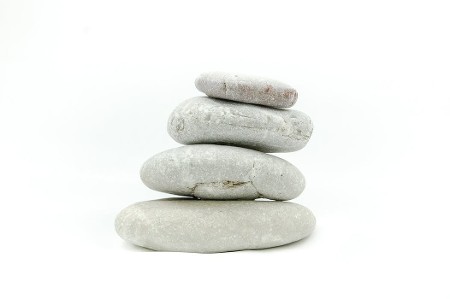Providing the Stress Management Support Your Deserve
Everyone has to deal with difficult people, whether they are argumentative, abusive, stubborn, or combative. The question is: how can you assert your rights without creating an unnecessary incident?
In most cases, angry people are screaming to be heard. They want to be valued, loved, and listened to. They want to feel important, but aren't able to express themselves constructively. With the right attitude, it's possible to get past these insecurities and reach an understanding. In this segment, we offer a range of approaches and tools to better assist you in managing your daily stress. Thank you for visiting this stress management segment.
|
|
|
 |
Page Update 08/22/2019
The Invisible Wound: Are we a Nation of Post-Traumatic Stress Disorder?
By Dr. Girgis N.D.
I wrote this article a few years ago. Unfortunately, things have not changed for the better since; if anything, the current political climate has made things much worse. So I decided to update the article and publish it again. It seems that incidents of gun violence keep repeating themselves; the only thing that changes is the names of the cities and the people involved. Just a few weeks ago, on August 3rd, 2019, we all were horrified to see the shooting in El Paso, which took 22 innocent lives and injured 24. This was immediately followed by another horrific shooting in Ohio on August 4th, killing 10 – including the gunman – and injuring 27.
|
|
In one weekend, 50 people were killed in one of Chicago’s poor and predominately black neighborhoods, yet no one got arrested. While in Washington D.C., several teenage girls with highly similar features, identities, and sizes disappeared. According to the Seattle Times, violent crimes increased nationally by 4.1% in 2016, and homicides increased by 8.6%. A total of 17,250 people were killed in 2016. Moreover:
• 36,000 Americans are killed by guns each year—an average of 100 per day.
• 100,000 Americans are shot and injured each year.
• In 2017, gun deaths reached their highest level in at least 40 years, with 39,773 deaths that year alone.
• Gun deaths increased by 16% from 2014 to 2017. (
• https://lawcenter.giffords.org
|
 |
Imagine the significance of 100 people dying EVERY DAY to gun violence. How is this not approached as an urgent epidemic that needs to be addressed as soon as possible by Congress?
Another statistic published by securitydata.com shows an increase in violence and mass shootings since 2001. In 2015, four mass shootings killed a total of 32 individuals. Let’s not forget all the other forms of violence in the United States that aren’t mass shootings (suicides, other shootings, etc.). U.S. youth homicide rates are more than 10 times that of any other leading industrialized nation. U.S. national violence containment costs are over $1.7 trillion per year: that is $7,000 for every man, woman, and child in the country. Studies have shown that violence by firearm use is 25 times higher in the United States in comparison to similarly developed countries. All this information begs the question: what is going on? Can we change this violence that is costing us money, destroying our society, and tearing our families apart?
|
|
After 9/11, the lives of every American – and every victim of the resulting American War on Terror – changed forever. Not a day goes by that we are not reminded of terrorism; it has become the constant subject of our TV screens and a word thrown around in the media daily.
|
|
All of this adds to the anxiety of the population; it simultaneously drains our resources. We become hypervigilant individuals who are reminded every day of imminent threats to our safety. This causes us to live increasingly isolated lives, which can add to the cycle of anxiety and stress. But is there a way we can reverse this trend?
Let’s first look at what post-traumatic stress disorder is.
Post-traumatic stress disorder (PTSD) is a stress and anxiety disorder caused by exposure to an overwhelmingly stressful and traumatic event such as war, rape, abuse, or violence. Individuals who repeatedly experience abuse, suffer neglect or endure violence can have a PTSD complex. 1 in every 3 Americans suffers from PTSD.
According to the Center for PTSD, 60% of men and 50% of women experience at least one trauma in their lives. About 11-20% of veterans face PTSD; the PTSD rate among Vietnam veterans was 30%. Although many people recuperate and return to normal life within a few months of a traumatic event, others continue to re-experience the trauma. The issue can become chronic.
|
 |
|
Symptoms of PTSD can vary from person to person, but generally, someone suffering from PTSD will experience persistent and increasing symptoms of arousal. Easily being startled, feeling frightened, difficulty sleeping, irritability, anger, overwhelming feeling of shame and guilt, difficulty focusing or remembering, mood changes, hypervigilance: these are just a few of the symptoms of PTSD. Often, symptoms can begin interfering with work by causing a person to avoid people and work responsibilities, or to display hostility and anger. Work can suffer as a result of being absent. Usually, this is the point at which most individuals seek help, or at least at which symptoms are noticed by coworkers or family members.
|
 |
For individuals who have PTSD, it is very important to seek help from specialized professionals.
But what can we do as ordinary individuals to help to heal ourselves from the overwhelming stress? Healing our society from this continuous state of anxiety which is causing us such a great deal of harm? Making us as ordinary citizens feel under tremendous stress. Worrying about family members and loved ones. Causing many sleepless nights, wondering what direction the country is going. Unfortunately, the current administration seems to fuel the situation rather than solve the problem. Any country with such a high level of gun violence would have passed the gun laws IMMEDIATELY without any hesitations. Yet, some Republicans and corporate-owned members of congress are ignoring this HUGE issue and epidemic of gun violence.
Here I would like to suggest a few simple steps, which can apply not only to PTSD patients but also the ordinary population:
1. Taking control in positive constructive ways.
Felling helplessness is the main reason for anxiety and stress. When we take actions that are perceived by our conscious and subconscious mind as being in control. This perception immediately makes us feel in the driver’s seat and control, therefore, relieves us from a feeling of helpless. Reducing stress and anxiety. This feeling of being in control is mentioned by me in my book and article on how to become stress hardy. We can feel in control by:
|
|
- Simple actions such as organizing a closet or ones carry bag can give us temporary relief of being in control. Despite the issue being unrelated, so start cleaning your closet or organize your desk. Anything that makes you feel in control.
-Get involve in politic, in all ways and steps. it is great to see an organization like mothers against gun violence such as Moms Demand Action
-We live in a very historic era when communication is easy as a click of a button.
-Reaching out to others in solving issues that endanger our lives is extremely important and full feeling in a positive way. Making us not only work for the good of the country. But, place us back in the driver seat. Engaging with each other to elect individuals that care about America and “we the people” instead of greedy Congress members and politicians working for corporations and special lobby groups. Try electing the right people or run for office yourself. Time for engagement in politic never been better or so much in desperate need of a grass-roots revolution.
Schools MUST not need to be equipped with guns, but with mental health professionals. Counselors and therapists who can identify and help individuals in need at the earliest stages of distress; or, students can have a chance to seek help from these trained individuals before committing suicide or an act of violence against others.
|
 |
The same care must be accessible to everyone in society who needs to manage their stress or resolve psychological conflicts. This is only possible when there is healthcare reform which covers psychological evaluations and treatments. Gun violence is a public health hazard. David Hemenway, professor of health policy at Harvard University's School of Public Health and director of the Harvard Injury Control Research Center and the Harvard Youth Violence Prevention Center, stated: "Differences in overall suicide rates across cities, states and regions in the United States are best explained not by differences in mental health, suicide ideation, or even suicide attempts, but by availability of firearms. … Many suicides are impulsive, and the urge to die fades away. Firearms are a swift and lethal method of suicide with a high case-fatality rate."
|
|
While reduced access to guns would lower the suicide rate in the United States, one must conclude that both mental health issues and gun availability must be addressed ASAP to prevent violence. Gun laws must be passed urgently. Steps need to be taken by professionals in reducing the anxiety and stress felt by the majority of people. This helping hand can be provided by elected officials that are actively addressing these issues. This includes electing individuals who can provide affordable health care. While demanding reasonable gun laws is a must for citizens, we should also elect anti-war individuals who will not only stop the billions( actually more of Trillions) of dollars lost in military costs but bring troops home and thereby lower PTSD numbers.
Governments can play a crucial role in providing accessible mental help for all citizens in need, without individuals being stigmatized, singled out, or in danger of losing their jobs. We must demand affordable access to mental care from our government. While we need to focus on gun control(ASAP), we also need a greater emphasis placed on affordable mental health care. After all, some countries allow their citizens to carry guns yet have virtually zero gun-related violence.
2. Curbing loneliness and breaking the walls of the divide:
I have written several articles about loneliness and its impact on our society as a whole. One can feel less isolated or lonely when there is closer neighborhood bonding, religious gathering to bond with likeminded people, classes to join, or charities to help places and people in need.
Join an art class, take music lessons or play music with others, dance classes; find a setting you can express yourself, freely and without censorship (of course we have to be aware of cultural sensitivities and importance of respect toward all).
The support of the family members, friends, and community is also extremely important. Make sure to seek emotional support groups. Reach out to peoples who are different as well as those who are similar. But, remembering we all belong to the same human specious and no color or religion or origin should separate un in connecting and helping one another. So break the wall of divide and lean on one another’s shoulder in visible and invisible ways.
|
|
3. Preventive steps:
a. Stress management technics
If you are suffering from PTSD or just trying to deal better with stress and anxiety, consider joining centers for meditation or practicing mindfulness. Simple steps such as guided imagery, cognitive restructuring, autogenic training, progressive muscle relaxations, and group therapy can be provided by speaking to a stress management professional. You can also seek tapes and CDs about these therapists from your local libraries.
Many exercise centers offer various classes from stretching to tai chi to yoga to martial arts. All of these activities are very beneficial to lower your anxiety and stress level so that you can go on living to some degree a normal life despite having PTSD.
|
 |
|
It is also beneficial for these types of stress management tools to be offered at schools, universities, and work settings. I tried – unfortunately without success – to start a stress management program in a community hospital in early 2007 for hospital staff. Sadly, I was unable to make the institution understand the necessity of such a program and proceed with it. It seemed that they would rather pay for sick leaves or conflict resolutions than to have preventative stress management for staff. These activities should also be paid for by the government or by the institutions themselves. It will cost much less to prevent violence than to repair its effects. Preventing violence would improve the moral, mental, and psychological well-being of our society.
|
|
b. laughter therapy
Add laughter to your daily regimen. Join a laughter therapy class, and engage in deep, belly-moving loud laughter regardless of how you feel. After a minute or two of laughter, you feel the joy. Try it; you’ll be amazed at the transformation. According to Dr. Madan Kataria from India who created “Laughter Yoga”: Laughter Yoga is based on the concept that our bodies can't tell the difference between real and fake laughter. Because both kinds of laughter produce the same beneficial results, it doesn't matter if a person has to fake a few laughs; there still may be great benefits for the mind and body.
|
 |
|
Laughter yoga is an easy way to incorporate laughter into your daily life, and it requires no special skills or athletic ability to practice. A typical session involves stretching, deep breathing, and laughter exercises. At the University of Maryland, a study done by scientists showed that watching humorous movies or sitcoms increases blood flow. Dr. Lee Berk and Dr. Stanley Tan of Loma Linda University published studies that show laughing lowers blood pressure and reduces stress hormones. It also triggers the release of endorphins, the body's natural painkillers, and produces a general sense of well-being. The results of the study also supported research indicating a general decrease in stress hormones that constrict blood vessels and suppress immune activity. For example, levels of epinephrine were lower in the group both in anticipation of humor and after exposure to humor. Epinephrine levels remained down throughout the experiment in this group relative to the control group.
Also, dopamine levels were decreased. Dopamine is involved in the "fight or flight response,” and is associated with elevated blood pressure. Laughter also reduces at least four of neuroendocrine hormones associated with a stress response. These are epinephrine, cortisol, DOPAC, and growth hormone. Laughing is also an aerobic exercise, providing a workout for the diaphragm and increasing the body's ability to use oxygen. It increases muscle flexion and muscle relaxation—a belly laugh results in muscle relaxation. While you laugh, the muscles that do not participate in the belly laugh relax. After you finish laughing, muscles that are involved in the laughter start to relax. Laughter can provide good cardiac conditioning as well, especially for those who are unable to perform physical exercises. Laughter is called “internal jogging”, and it has all the psychological benefits of good workouts. Laughter stimulates the release of hormones called endorphins (“Happy Hormones”). This causes people to feel happier and less stressed.
|
c. Food and beverages matter.
It was very interesting and also very sad to watch the recent Congressional hearing about Brett Kavanaugh, the Supreme Court nominee. I couldn’t help but notice that on one side, Dr. Ford was holding her Coca Cola as her life depended on it, while on the other, Judge Kavanaugh was talking about drinking beer like it was holy water. In reality, Alcohol and soft drinks are both very bad for us as far as stress and anxiety are concerned, not to mention they are also not good for overall health and wellbeing on many levels.
|
 |
Drinks with caffeine and can also increase the sympathomimetic effects of stress, increasing heart rate and breathing to a degree similar to fight-or-flight situations. Alcohol, on the other hand, can not only affect the body’s absorption of vitamins and minerals that are extremely important for repairs of neurons and other body parts, but it can also greatly impede peaceful sleep – despite its slightly sedative effect on us. This is incredibly important for our overall state of mind and sense of relaxation. The same is true of the food and nutrients we place in our mouths. So stay away from caffeinated drinks, alcohol, high sugar contents, and smoking if you are undergoing lots of stress in your life. Drink lots of clean water and eat healthy, fresh food. Consume lots of vegetables and a few fruits each day. As always, we know we are what we eat.
|
|
|
|
Additional Articles
|
 Health: The Biology of Joy Health: The Biology of Joy
Read More
|

Research suggests marital stress can inflame lining of gut, allow bacteria into bloodstream
Read More
|

Aging and Stress
Read More
|
|
|
|

More Reasons to Meditate
Read More |

The Tell Tale Signs of Burnout ... Do You Have Them?
Read More
|
 Therapeutic effects of music Therapeutic effects of music
Read More
|
|
|
|
|